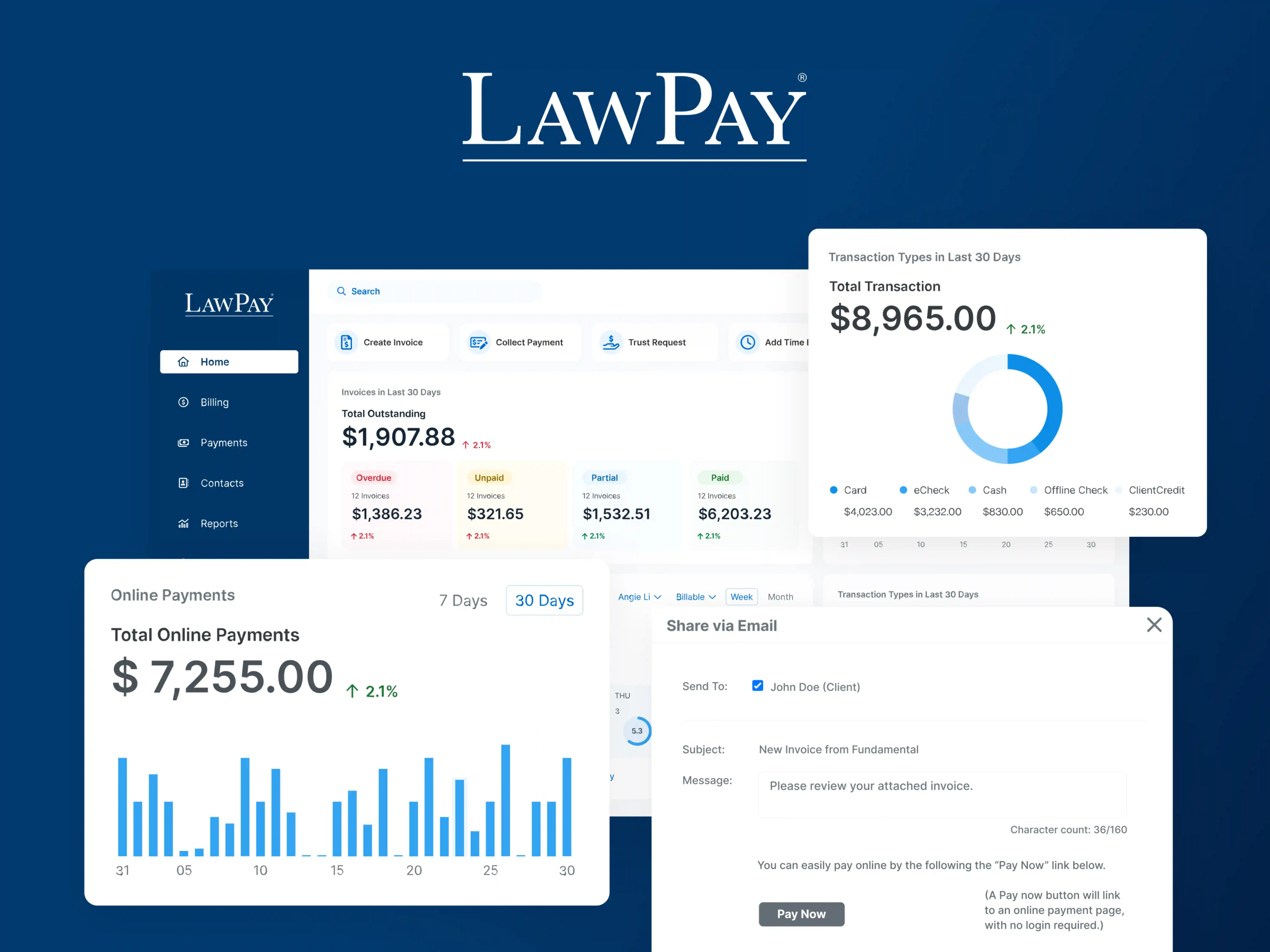Key takeaways
A law firm budget consists of an outline or plan that helps firms manage their money and reach their financial goals. Budgets should include the law firm’s expenses, projected revenue, short- and long-term financial goals and should be reviewed and updated often to reflect the business’s current financial health.
Having a well-planned law firm budget can help your firm make informed decisions, avoid financial surprises, and make it easier to achieve long-term goals. However, routine expenses can add up quickly.
For example, our recent 2024 Benchmark Report Part 1: Law Firm Finances found that:
Family law practices incurred an average of 3.7 expenses per case.
Personal injury practices incurred an average of 4.1 expenses per case.
Trust and estate, real estate, and criminal law practices incurred an average of 2.8 expenses per case.
Planning for expenses in your budget can mean the difference between improving your profits or encountering unwelcome surprises.
In this article, we'll share practical steps and tips to create a smarter law firm budget that helps you stay on top of your law firm’s finances and thrive in a competitive market.
What to Consider Before Creating Your Law Firm’s Budget
Whether you’re starting your own law firm or trying to streamline costs at an existing firm, having a budget can help improve financial health visibility and finance management. However, the key to successful law firm budgeting is accurately accounting for estimated costs.
Below are a few considerations that can help your law firm develop a strategic budgeting plan.
Expenses
Failing to account for your routine costs can negatively impact cash flow. For example, say your staff isn’t great at logging receipts for their expenses. This makes it difficult for your firm to have an accurate pulse on your cash flow.
While the exact types of expenses can vary based on practice type, number of attorneys, and other similar factors, below is a list of the most common law firm operating expenses to consider:
Insurance
Utilities
Bar memberships
Malpractice coverage
Legal research tools
Accounting software
Supplies
Court filing fees
Expert witness fees
Transcript costs
Established law firms can use their previous year’s expenses to estimate costs for their new budget. New law firms will have to estimate their expenses based on projections or what’s common for other practices in your area.
Revenue Sources
If you’re not sure where your money is coming from, it can be tough to ensure that you’re on pace to hit the firm’s projections and goals.
Start by tracking your actual and estimated revenue for the month, quarter, and year. This will give you an idea of how much money you’ll be bringing in and can help you determine the size of your budget. From there, you can use this information to set realistic goals and determine how much you can allocate to different expenses.
Also, consider factors such as past revenue, projected growth, and changes in the legal market when evaluating revenue sources. By looking at these factors, you’ll be better able to create a data-informed budget that accommodates your current and future expenses.
Budget Tracking
Budgets are living documents. If you’re not monitoring them throughout the year, you could end up missing opportunities to make necessary changes that keep your finances in good shape.
Consider monitoring your budget in a spreadsheet, accounting for all incoming revenue and outgoing expenses. You can also use a law firm budget tracking app to help automate the process.

How to Create a Law Firm Budget
Your firm’s expenses will depend on the type of practice you run, the number of staff you have, and other similar factors. Below are helpful steps to create a budget that works for your situation.You can also check out our financial management tips for more guidance.
Step 1: Use Data To Project Future Revenue
Having at least a rough idea of your firm’s future revenue can help you set future goals.
If your firm is new, estimate your expected revenue for the year. You can do this by multiplying the price of your services by the number of cases you expect to take on. Use this number as a starting point and prepare to adjust your revenue projections as you take on new clients and cases.
If your firm has been open for at least a year, you can look at past data to understand seasonal trends, average revenue, and other factors. Try to include projected costs—factoring in changes in demand for your services and other economic conditions that may impact your bottom line. This will help you account for fluctuations in business.
Though it’s possible to go through the data on your own, it’s often easier to use data analysis tools to help you sort through the information. If you’ve been working with existing law firm accounting software, you can use legal reporting software to run reports on your previous year’s revenue and costs. These tools should save you time and streamline the data analysis process.
Step 2: Gain a Clear Understanding of All Possible Expenses
Without knowing where your money is going, you won’t be able to measure your firm’s ability to stick to your budget. Consider using these methods to streamline your expense-tracking efforts:
Use business credit cards: Consider using business credit cards for all business-related expenses. This will help you separate personal expenses from business expenses and make it easier to track spending month to month.
Establish expense reporting procedures: When everyone reports their expenses in a timely manner, you’re better able to see where your money is going. Encourage your staff to report all expenses at least once a week so nothing gets missed.
Simplify the process with LawPay Smart Spend: Smart Spend lets you streamline your billing and bookkeeping efforts and set clear spending controls with the LawPay Visa Business Card right in the app. Sign up for the Smart Spend waitlist to be among the first law firms to leverage this service.
Factor in everything from utilities and rent to filing fees and postage. Your budget should incorporate any expenses you think your firm may face.
Step 3: Minimize Expenses When Starting Out
Keeping your expenses as low as possible at first is a good idea, even if you’ve budgeted for higher costs. Try using the following tips at your firm:
Set spending limits for non-essential expenses, like client lunches, for each attorney at your firm.
Shift your billing and payment options to an online platform to cut down on late payments.
Routinely review subscriptions and tools for relevance and utility. Cut out any subscriptions your firm isn’t actively using.
Negotiate with your vendors to secure better rates on essentials like software products and office supplies.
The less you spend each month, the more you can save—making it easier to build a financial cushion for your practice and remain profitable.
Step 4: Create Goals
Next, set short- and long-term goals for your business. Let’s look at some examples:
Short-Term Goals | Long-Term Goals |
Reduce operating costs to build savings | Bring on an additional attorney to grow the practice |
Bring in three new clients each month to increase revenue | Expand into a new location to diversify clientele and increase cash flow |
Update your law firm’s website to help attract new clients | Offer pro-bono representation to create opportunities for referrals |
Here’s what this might look like in real life. Say you’ve set a short-term goal of bringing in three new clients each month to increase your firm’s revenue. To accomplish this, you’d want to:
Strategically increase what you’re spending on marketing each month to get your firm’s name in front of prospective clients.
Request reviews or testimonials from your current clients.
Start networking and participating in community events to increase awareness of your firm.
Afterward, break each goal down into actionable steps. This will help create a clear plan through individual tactics.
Step 5: Take Advantage of Software Tools
Managing your budget can be complicated without the right tools in place. Below are tools that your firm can invest in:
Law firm accounting software: This software lets you digitally manage your books, send and update invoices, and more. Each system is different, but the goal is to streamline your accounting efforts and centralize your business’s finances in one place.
Payment processing software: The best payment processing software options can make client payment collection easier. It should offer an intuitive interface and support multiple payment methods.
Reporting software: These programs let you create comprehensive financial reports for your firm based on the information collected in your accounting tools.
Time-tracking programs: These programs make it easy for attorneys and support staff to track the time spent working on each case—so no billable hour falls between the cracks.
Billing tools and toolkits: Billing tools help your firm establish best practices and create consistency when billing clients.
With these type of tools, your firm can automate most of your budget and run routine reports to ensure that you’re staying within your targets. Plus you’ll spend less time focusing on non-billable hours and more on billable work.
Step 6: Look to Financial Data In Your Industry
By researching industry trends, you’ll gain insights into potential challenges your firm may face and any financial setbacks you may want to prepare for. The more information you have, the easier it will be to make sure your budget accounts for all risks.
Start by researching the rates lawyers charge in your state or municipality. Check different firms’ websites for rate information and compare it against your rates. This can help you evaluate your rates to ensure they’re competitive. Depending on the type of cases you take on, you might review other law firms’ billing structures to see if different methods could make your firm more marketable.
What to Include In a Law Firm Budget
Though each individual practice should tailor their budget, there are a few things you’ll want to factor into your plan. Below are a few of the most common considerations:
Operating expenses: These costs include salaries, equipment, utilities, office supplies, and other similar expenses.
Staffing costs: Account for all wages paid to yourself and your team. If you plan on bringing in new talent, factor future salaries into the budget.
Revenue projections: Having a clear idea of how much money your firm will likely bring in over the year can help you create a functional budget. Include those projections to track your progress and adjust your budget based on real-time data.
Marketing expenses: Marketing your firm helps attract new clients and boost your reputation. Account for any and all marketing expenses in your budget.

Why Should You Prioritize Law Firm Budgeting?
While budgeting is an important component of any successful business, there are three key reasons why legal practices should have a clear law firm budgeting plan in place.
Gain a clear overview of the firm's financial health. At any point, you should be able to identify any areas where you need to allocate more resources or cut back on expenses. Say you’ve lost a few clients and need to focus on building your roster. You may need to allocate a larger portion of your budget to marketing and cut back on office supplies or other less essential expenses.
Ability to plan for future growth through informed decisions. By having a budget in place, you can set financial goals and work strategically towards achieving them. This can help you grow your practice, create plans to bring on new attorneys and support staff, and support your long-term plans.
Preparation for unexpected expenses or emergencies. You’ll enjoy peace of mind knowing you’re covered in case of an unforeseen expense. For example, if a client misses a payment or you lose a case billed on a contingency basis, you’ll still have enough savings to keep your firm running.
Overall, your budget can help with your law firm management efforts and set you up for long-term success.
Download our Law Firm Profitability Playbook to learn how to improve cash flow, improve the payment experience, and get paid faster.
Tips for Managing and Modernizing Your Law Firm’s Budget
Creating a budget is just the tip of the iceberg. Once you have a plan in place, you’ll want to manage it closely and find ways to modernize your practice to help you stay on target and stick to that budget. Here are a few tips to help:
Use the right software: Investing in programs and digital tools, like law firm budget tracking software, can help you automate your accounting efforts and make it easier to stay on budget.
Go digital when possible: Stop relying solely on hard copies and paper files by transitioning to digital storage solutions. This will help you better search for information when needed, potentially saving you on labor costs. You can take it a step further and send clients electronic invoices by email to reduce your risk of late or missed payments.
Run reports often: Check in with your budget at least once every quarter and make any necessary adjustments to accommodate your growing and changing practice.
Execute Your Law Firm Budget With LawPay
By carefully considering your expenses, revenue projections, and financial goals, you can make informed decisions to help your firm grow and thrive. With the tools offered by LawPay, you can streamline your bookkeeping and legal accounting processes.
Take the first step today, and schedule a demo to learn how LawPay can help you with your law firm's budget plan. Your future self and practice will thank you for it.
Schedule a demo to see what LawPay can offer your firm.
Book Now
About the author

Gabriela JheanContent Writer
Gabriela Jhean is a Content Writer for leading legal software companies, including MyCase, Docketwise, CPACharge, CASEpeer, and LawPay—the #1 legal payment processor. She covers emerging legal technology, financial wellness for law firms, the latest industry trends, and more.
